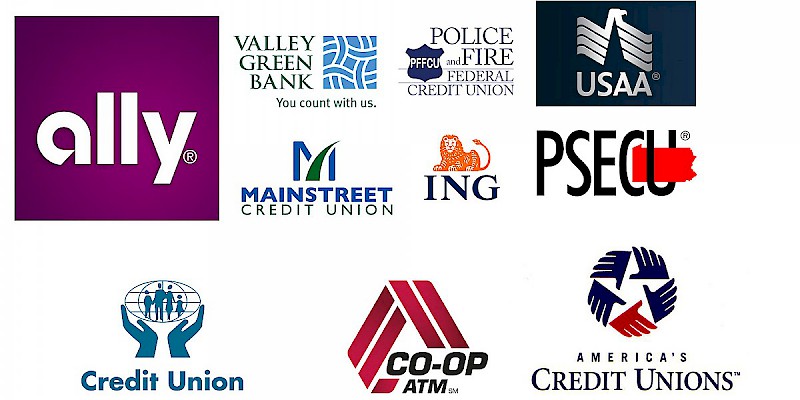Finding a better bank

Use a credit union, online bank, local bank, or no-fee/low-fee credit card to keep foreign transaction fees (and all other bank fees) to a minimum
Do you hate your bank? Don't worry; Most people do.
After all, banks exist solely to make money from playing sophisticated cup-and-ball games with your money (and look where THAT landed our economy by 2008).
Most people look upon their bank as a necessary evil of everyday life. It doesn't have to be that way.
Big banks are beholden only to their shareholders and their quarterly profit reports, not to you. You are the cow they milk for cash.
Tired of saying "moo" every time you hit an ATM and are charged a $2.50 fee? The solution is simple: break up with your bank.
How to break up with your bank
Honestly, it takes an hour or two, max, to leave your bank for a credit union, online-only bank, local bank, or other financial institution that exists not so much to make money off of you as to provide you with excellent, largely fee-free services, including fee-free ATM usage and no foreign transaction fees.
Just open a new account elsewhere, switch any direct deposits to it, then switch any bill paying services to the new account. That's it.
(Well, see the sidebar on the right for some prudent tips on the process.)
To be extra cautious, disable automated bill-pay for everything (monthly credit card payments, health insurance premiums, mortgage and car payments, etc.) and for a month or two just pay those the old-fashioned way—by check—until you are sure the old account is not getting any bill-pay requests and the new account is up and running and ready to handle auto-pay getting switched back on.
How to find a credit union or local bank
Best financial decision I've ever made was to open an account with a local credit union.
Not only are all sorts of fees minimal or nonexistent, but the interest rates on credit card charges are laughably low (6.9% usually), and both my savings and checking accounts earn interest—with no minimums. It also doesn't charge me for out-of network ATMs usage, including overseas.
I love my credit union—and local banks are similar. Here's where you can start searching for one of your own:
How to find an online-only bank
Some folks with far more fiduciary knowledge than I swear by these. I was a tad suspicious—not for their lack of local offices (when was the last time I did banking in person anyway? It's nearly always online or over the phone), but because many of them are yoked to major financial institutions—automobile associations, major investment firms, etc.—and, once again, I simply don't trust any institution whose sole purpose is to make money off of me.
However, more than a year ago I started using Ally, and now I use it as my primary bank and it has been a godsend.
Major bank credit cards with minor fees
Not all big banks are as greedy as those who routinely make the evening news for their latest affront against society—at least not in the context of charging fees for foreign transactions.
Of the big national credit card issuers, here are a few I know of that—last time I checked—charged either nothing or 1% (on top of Visa's 1%) for overseas purchases:
- Capital One (capitalone.com), 0%
- HSBC (hsbc.com), 1%
- Providian (providian.com), 1%
- Ally.com - Online-only bank (and the one I use), with ATM feee refunds and no foreign transaction fees. Sadly, no credit cards (yet)—though you can use your MasterCard-branded bank card as a debit card.
- Usaa.com - Online-only bank open to current and former U.S. military personnel and their families; ATM fee refunds, and credit cards with only 1% foreign transaction fees.
- Schwab.com - This famous brokerage firm also offers online-only checking and savings accounts with ATM fee refunds.
- Asmarterchoice.org - Credit union–finding site. Credit unions often have low or no foreign trasnaction fees on their credit cards, ATM fee–refund policies, very few fees, and interest-bearing checking accounts. In other words: What a bank should be.
- Findabetterbank.com - Site to find credit unions and other local banks. These often have low or no foreign transaction fees on their credit cards and ATM fee–refund policies.
- Ncua.gov - All about credit unions.
- Credituniondb.com - Bare-bones credit union-finding database.
- Findabetterbank.com - Site to find credit unions and other local banks. These often have low or no foreign transaction fees on their credit cards and ATM fee–refund policies.
- Capitalone.com - Offers cards with no foreign transaction fee, and chip-and-signature enabled (making it easier to use in Europe).
- Bankofamerica.com - Offers cards with no foreign transaction fee, and chip-and-signature enabled (making it easier to use in Europe).
- Madfientist.cardratings.com - Good simple search engine to find travel-worthy cards, from no foreign fees to the ones with the best points.






